Influences of Internationalization on Corporate Governance, Culture, Leadership, Functions and Structure
VerifiedAdded on 2023/06/07
|15
|4960
|194
AI Summary
This report discusses the key factors that drive global commerce and trade, the complexity of strategic challenges faced by organisations when operating in a global environment, and the influences of internationalization on corporate governance, culture, leadership, functions and structure. It also includes a PESTLE analysis of SASOL and the application of the McKinsey 7's model to the company.
Contribute Materials
Your contribution can guide someone’s learning journey. Share your
documents today.
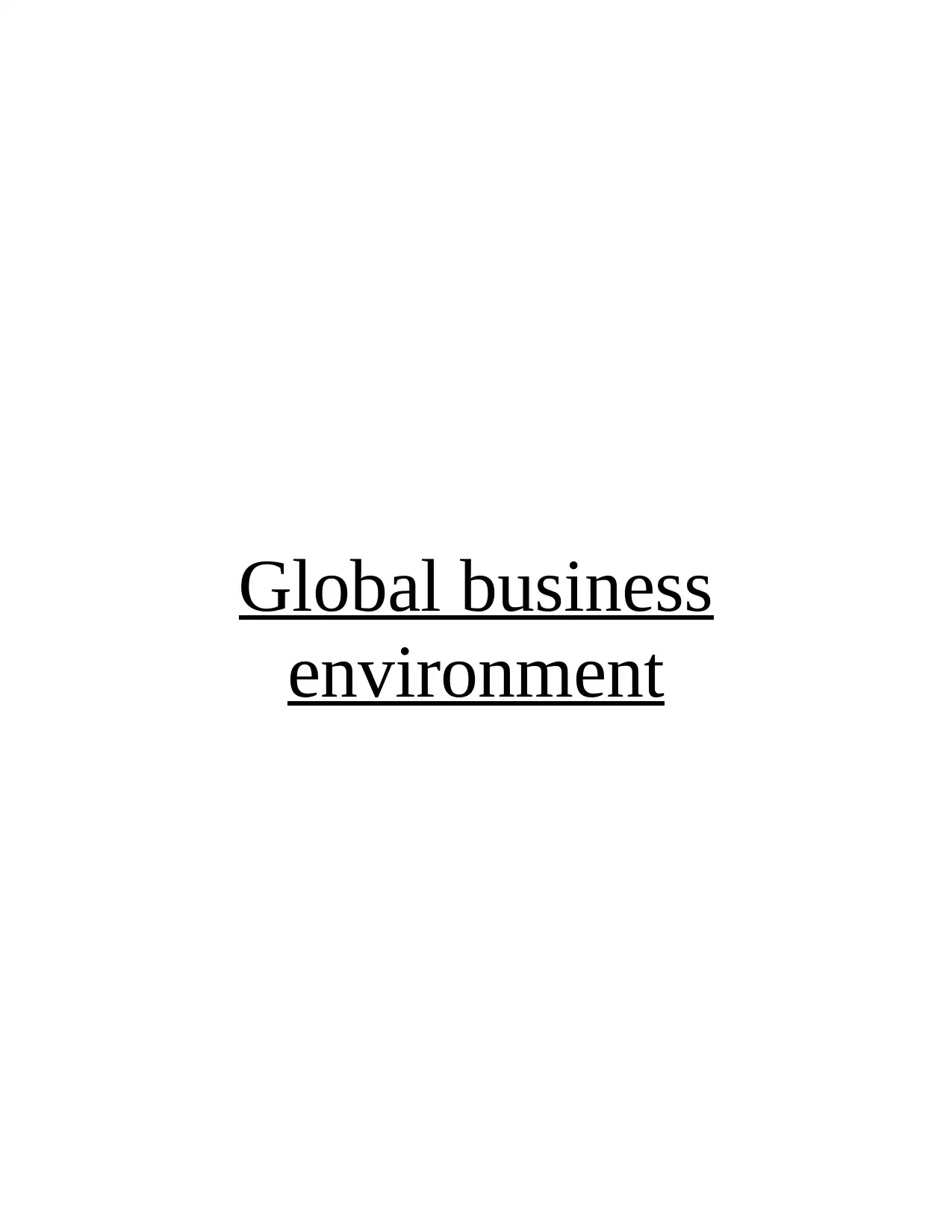
Global business
environment
environment
Secure Best Marks with AI Grader
Need help grading? Try our AI Grader for instant feedback on your assignments.
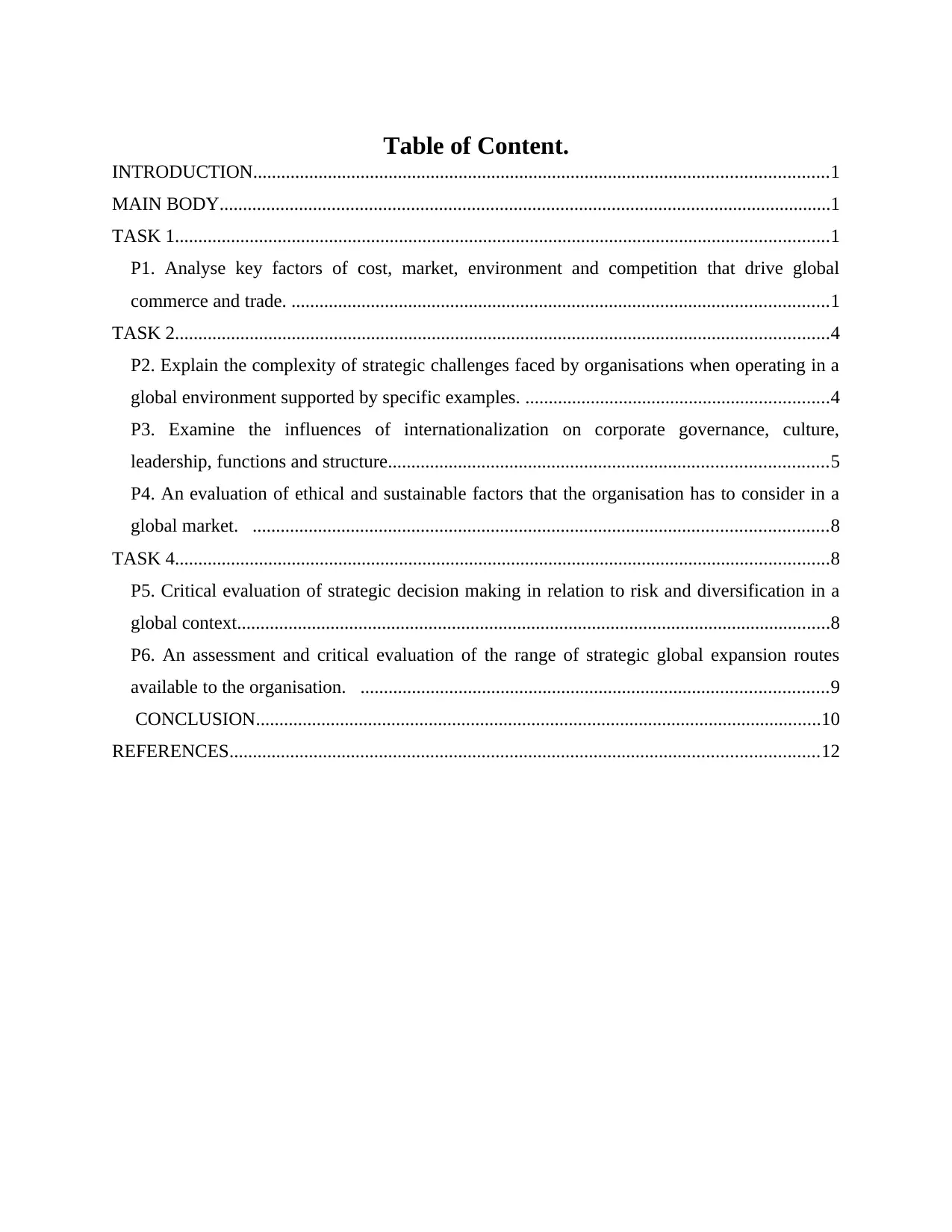
Table of Content.
INTRODUCTION...........................................................................................................................1
MAIN BODY...................................................................................................................................1
TASK 1............................................................................................................................................1
P1. Analyse key factors of cost, market, environment and competition that drive global
commerce and trade. ...................................................................................................................1
TASK 2............................................................................................................................................4
P2. Explain the complexity of strategic challenges faced by organisations when operating in a
global environment supported by specific examples. .................................................................4
P3. Examine the influences of internationalization on corporate governance, culture,
leadership, functions and structure..............................................................................................5
P4. An evaluation of ethical and sustainable factors that the organisation has to consider in a
global market. ...........................................................................................................................8
TASK 4............................................................................................................................................8
P5. Critical evaluation of strategic decision making in relation to risk and diversification in a
global context...............................................................................................................................8
P6. An assessment and critical evaluation of the range of strategic global expansion routes
available to the organisation. ....................................................................................................9
CONCLUSION.........................................................................................................................10
REFERENCES..............................................................................................................................12
INTRODUCTION...........................................................................................................................1
MAIN BODY...................................................................................................................................1
TASK 1............................................................................................................................................1
P1. Analyse key factors of cost, market, environment and competition that drive global
commerce and trade. ...................................................................................................................1
TASK 2............................................................................................................................................4
P2. Explain the complexity of strategic challenges faced by organisations when operating in a
global environment supported by specific examples. .................................................................4
P3. Examine the influences of internationalization on corporate governance, culture,
leadership, functions and structure..............................................................................................5
P4. An evaluation of ethical and sustainable factors that the organisation has to consider in a
global market. ...........................................................................................................................8
TASK 4............................................................................................................................................8
P5. Critical evaluation of strategic decision making in relation to risk and diversification in a
global context...............................................................................................................................8
P6. An assessment and critical evaluation of the range of strategic global expansion routes
available to the organisation. ....................................................................................................9
CONCLUSION.........................................................................................................................10
REFERENCES..............................................................................................................................12
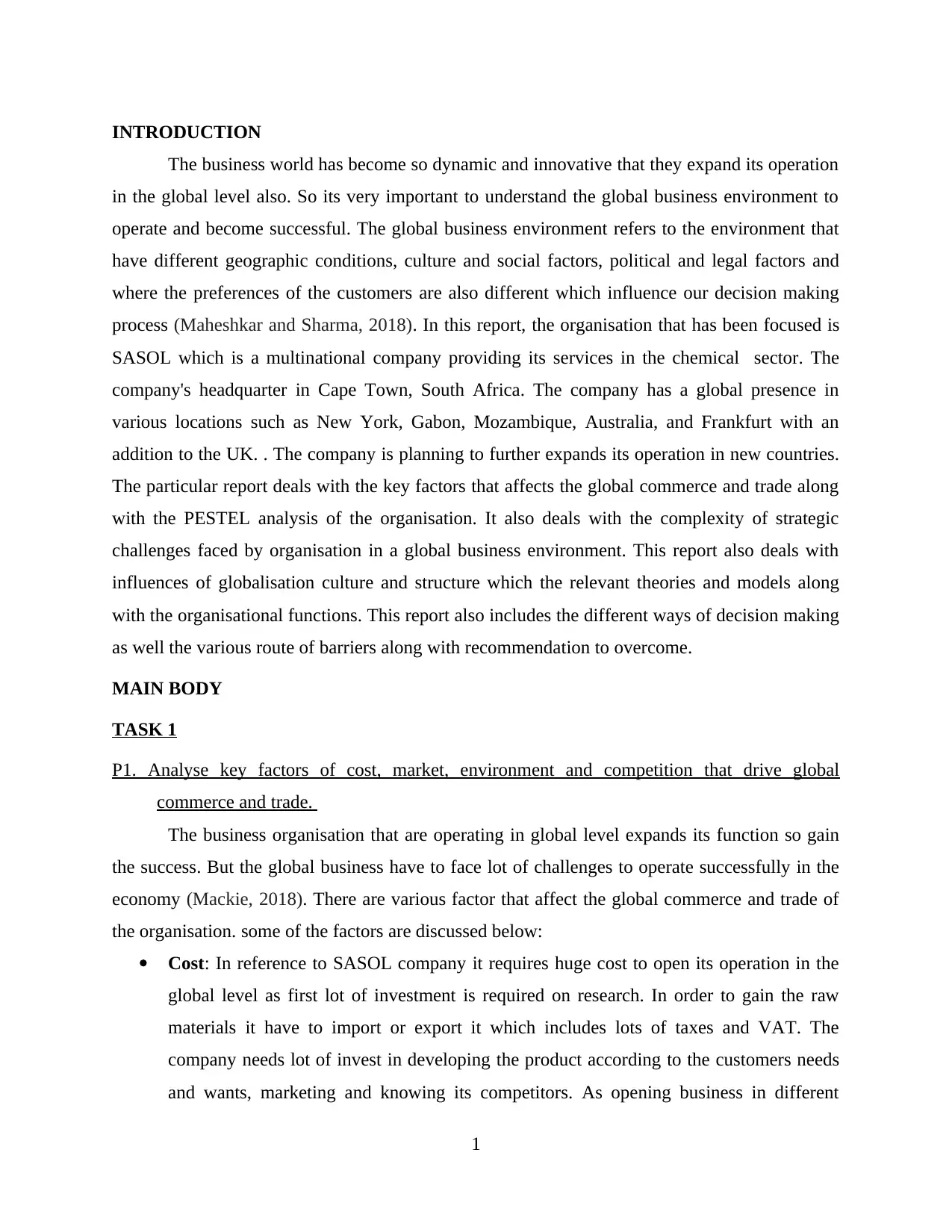
INTRODUCTION
The business world has become so dynamic and innovative that they expand its operation
in the global level also. So its very important to understand the global business environment to
operate and become successful. The global business environment refers to the environment that
have different geographic conditions, culture and social factors, political and legal factors and
where the preferences of the customers are also different which influence our decision making
process (Maheshkar and Sharma, 2018). In this report, the organisation that has been focused is
SASOL which is a multinational company providing its services in the chemical sector. The
company's headquarter in Cape Town, South Africa. The company has a global presence in
various locations such as New York, Gabon, Mozambique, Australia, and Frankfurt with an
addition to the UK. . The company is planning to further expands its operation in new countries.
The particular report deals with the key factors that affects the global commerce and trade along
with the PESTEL analysis of the organisation. It also deals with the complexity of strategic
challenges faced by organisation in a global business environment. This report also deals with
influences of globalisation culture and structure which the relevant theories and models along
with the organisational functions. This report also includes the different ways of decision making
as well the various route of barriers along with recommendation to overcome.
MAIN BODY
TASK 1
P1. Analyse key factors of cost, market, environment and competition that drive global
commerce and trade.
The business organisation that are operating in global level expands its function so gain
the success. But the global business have to face lot of challenges to operate successfully in the
economy (Mackie, 2018). There are various factor that affect the global commerce and trade of
the organisation. some of the factors are discussed below:
Cost: In reference to SASOL company it requires huge cost to open its operation in the
global level as first lot of investment is required on research. In order to gain the raw
materials it have to import or export it which includes lots of taxes and VAT. The
company needs lot of invest in developing the product according to the customers needs
and wants, marketing and knowing its competitors. As opening business in different
1
The business world has become so dynamic and innovative that they expand its operation
in the global level also. So its very important to understand the global business environment to
operate and become successful. The global business environment refers to the environment that
have different geographic conditions, culture and social factors, political and legal factors and
where the preferences of the customers are also different which influence our decision making
process (Maheshkar and Sharma, 2018). In this report, the organisation that has been focused is
SASOL which is a multinational company providing its services in the chemical sector. The
company's headquarter in Cape Town, South Africa. The company has a global presence in
various locations such as New York, Gabon, Mozambique, Australia, and Frankfurt with an
addition to the UK. . The company is planning to further expands its operation in new countries.
The particular report deals with the key factors that affects the global commerce and trade along
with the PESTEL analysis of the organisation. It also deals with the complexity of strategic
challenges faced by organisation in a global business environment. This report also deals with
influences of globalisation culture and structure which the relevant theories and models along
with the organisational functions. This report also includes the different ways of decision making
as well the various route of barriers along with recommendation to overcome.
MAIN BODY
TASK 1
P1. Analyse key factors of cost, market, environment and competition that drive global
commerce and trade.
The business organisation that are operating in global level expands its function so gain
the success. But the global business have to face lot of challenges to operate successfully in the
economy (Mackie, 2018). There are various factor that affect the global commerce and trade of
the organisation. some of the factors are discussed below:
Cost: In reference to SASOL company it requires huge cost to open its operation in the
global level as first lot of investment is required on research. In order to gain the raw
materials it have to import or export it which includes lots of taxes and VAT. The
company needs lot of invest in developing the product according to the customers needs
and wants, marketing and knowing its competitors. As opening business in different
1
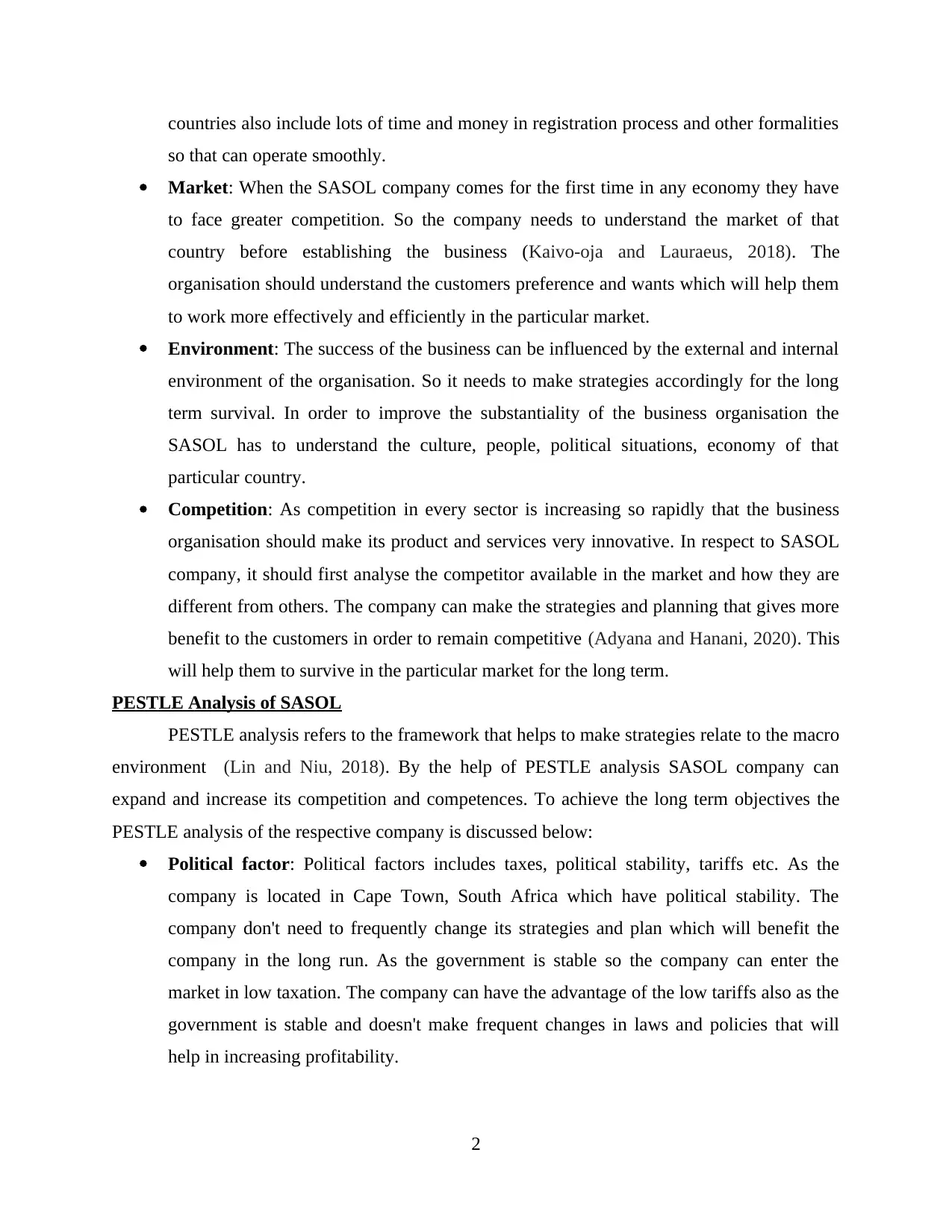
countries also include lots of time and money in registration process and other formalities
so that can operate smoothly.
Market: When the SASOL company comes for the first time in any economy they have
to face greater competition. So the company needs to understand the market of that
country before establishing the business (Kaivo-oja and Lauraeus, 2018). The
organisation should understand the customers preference and wants which will help them
to work more effectively and efficiently in the particular market.
Environment: The success of the business can be influenced by the external and internal
environment of the organisation. So it needs to make strategies accordingly for the long
term survival. In order to improve the substantiality of the business organisation the
SASOL has to understand the culture, people, political situations, economy of that
particular country.
Competition: As competition in every sector is increasing so rapidly that the business
organisation should make its product and services very innovative. In respect to SASOL
company, it should first analyse the competitor available in the market and how they are
different from others. The company can make the strategies and planning that gives more
benefit to the customers in order to remain competitive (Adyana and Hanani, 2020). This
will help them to survive in the particular market for the long term.
PESTLE Analysis of SASOL
PESTLE analysis refers to the framework that helps to make strategies relate to the macro
environment (Lin and Niu, 2018). By the help of PESTLE analysis SASOL company can
expand and increase its competition and competences. To achieve the long term objectives the
PESTLE analysis of the respective company is discussed below:
Political factor: Political factors includes taxes, political stability, tariffs etc. As the
company is located in Cape Town, South Africa which have political stability. The
company don't need to frequently change its strategies and plan which will benefit the
company in the long run. As the government is stable so the company can enter the
market in low taxation. The company can have the advantage of the low tariffs also as the
government is stable and doesn't make frequent changes in laws and policies that will
help in increasing profitability.
2
so that can operate smoothly.
Market: When the SASOL company comes for the first time in any economy they have
to face greater competition. So the company needs to understand the market of that
country before establishing the business (Kaivo-oja and Lauraeus, 2018). The
organisation should understand the customers preference and wants which will help them
to work more effectively and efficiently in the particular market.
Environment: The success of the business can be influenced by the external and internal
environment of the organisation. So it needs to make strategies accordingly for the long
term survival. In order to improve the substantiality of the business organisation the
SASOL has to understand the culture, people, political situations, economy of that
particular country.
Competition: As competition in every sector is increasing so rapidly that the business
organisation should make its product and services very innovative. In respect to SASOL
company, it should first analyse the competitor available in the market and how they are
different from others. The company can make the strategies and planning that gives more
benefit to the customers in order to remain competitive (Adyana and Hanani, 2020). This
will help them to survive in the particular market for the long term.
PESTLE Analysis of SASOL
PESTLE analysis refers to the framework that helps to make strategies relate to the macro
environment (Lin and Niu, 2018). By the help of PESTLE analysis SASOL company can
expand and increase its competition and competences. To achieve the long term objectives the
PESTLE analysis of the respective company is discussed below:
Political factor: Political factors includes taxes, political stability, tariffs etc. As the
company is located in Cape Town, South Africa which have political stability. The
company don't need to frequently change its strategies and plan which will benefit the
company in the long run. As the government is stable so the company can enter the
market in low taxation. The company can have the advantage of the low tariffs also as the
government is stable and doesn't make frequent changes in laws and policies that will
help in increasing profitability.
2
Secure Best Marks with AI Grader
Need help grading? Try our AI Grader for instant feedback on your assignments.
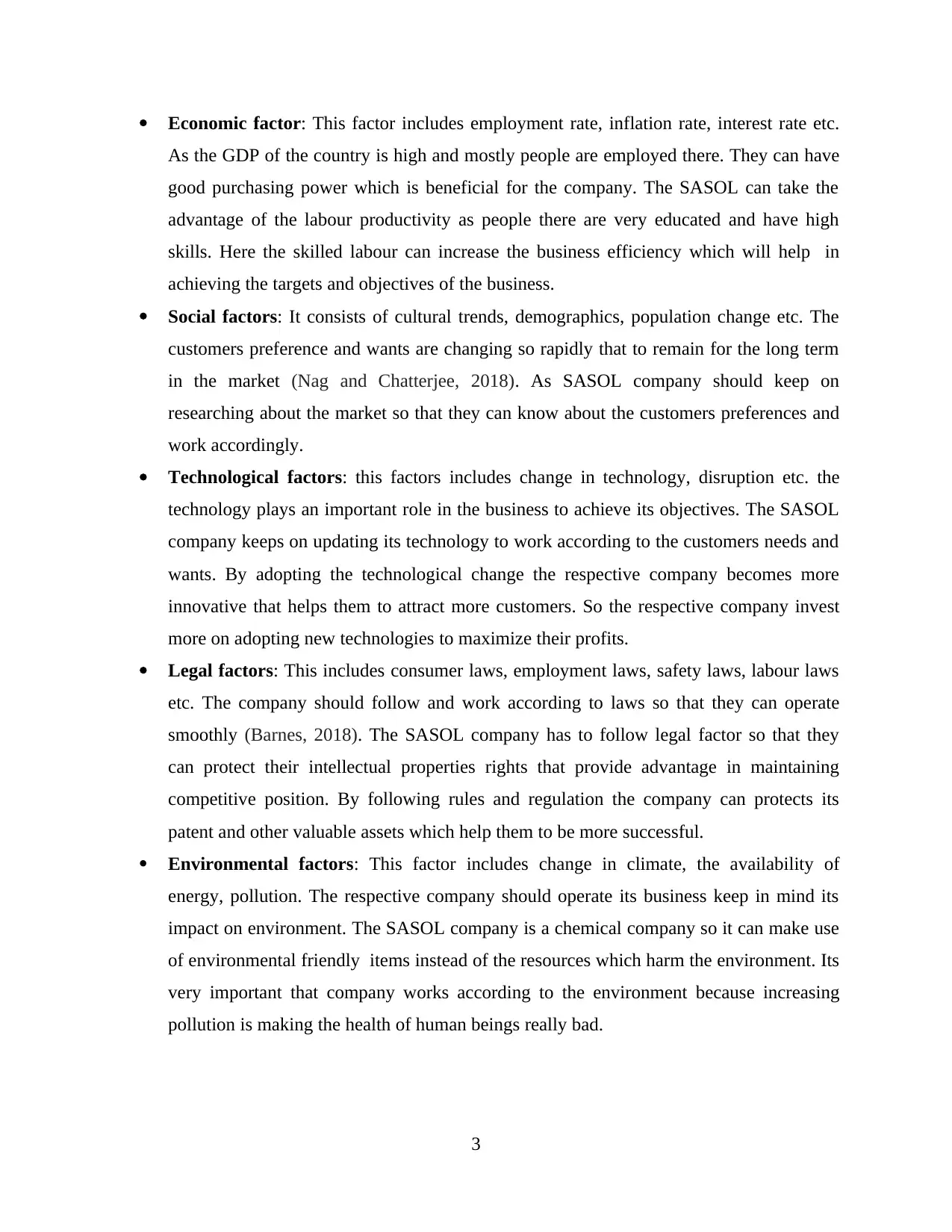
Economic factor: This factor includes employment rate, inflation rate, interest rate etc.
As the GDP of the country is high and mostly people are employed there. They can have
good purchasing power which is beneficial for the company. The SASOL can take the
advantage of the labour productivity as people there are very educated and have high
skills. Here the skilled labour can increase the business efficiency which will help in
achieving the targets and objectives of the business.
Social factors: It consists of cultural trends, demographics, population change etc. The
customers preference and wants are changing so rapidly that to remain for the long term
in the market (Nag and Chatterjee, 2018). As SASOL company should keep on
researching about the market so that they can know about the customers preferences and
work accordingly.
Technological factors: this factors includes change in technology, disruption etc. the
technology plays an important role in the business to achieve its objectives. The SASOL
company keeps on updating its technology to work according to the customers needs and
wants. By adopting the technological change the respective company becomes more
innovative that helps them to attract more customers. So the respective company invest
more on adopting new technologies to maximize their profits.
Legal factors: This includes consumer laws, employment laws, safety laws, labour laws
etc. The company should follow and work according to laws so that they can operate
smoothly (Barnes, 2018). The SASOL company has to follow legal factor so that they
can protect their intellectual properties rights that provide advantage in maintaining
competitive position. By following rules and regulation the company can protects its
patent and other valuable assets which help them to be more successful.
Environmental factors: This factor includes change in climate, the availability of
energy, pollution. The respective company should operate its business keep in mind its
impact on environment. The SASOL company is a chemical company so it can make use
of environmental friendly items instead of the resources which harm the environment. Its
very important that company works according to the environment because increasing
pollution is making the health of human beings really bad.
3
As the GDP of the country is high and mostly people are employed there. They can have
good purchasing power which is beneficial for the company. The SASOL can take the
advantage of the labour productivity as people there are very educated and have high
skills. Here the skilled labour can increase the business efficiency which will help in
achieving the targets and objectives of the business.
Social factors: It consists of cultural trends, demographics, population change etc. The
customers preference and wants are changing so rapidly that to remain for the long term
in the market (Nag and Chatterjee, 2018). As SASOL company should keep on
researching about the market so that they can know about the customers preferences and
work accordingly.
Technological factors: this factors includes change in technology, disruption etc. the
technology plays an important role in the business to achieve its objectives. The SASOL
company keeps on updating its technology to work according to the customers needs and
wants. By adopting the technological change the respective company becomes more
innovative that helps them to attract more customers. So the respective company invest
more on adopting new technologies to maximize their profits.
Legal factors: This includes consumer laws, employment laws, safety laws, labour laws
etc. The company should follow and work according to laws so that they can operate
smoothly (Barnes, 2018). The SASOL company has to follow legal factor so that they
can protect their intellectual properties rights that provide advantage in maintaining
competitive position. By following rules and regulation the company can protects its
patent and other valuable assets which help them to be more successful.
Environmental factors: This factor includes change in climate, the availability of
energy, pollution. The respective company should operate its business keep in mind its
impact on environment. The SASOL company is a chemical company so it can make use
of environmental friendly items instead of the resources which harm the environment. Its
very important that company works according to the environment because increasing
pollution is making the health of human beings really bad.
3
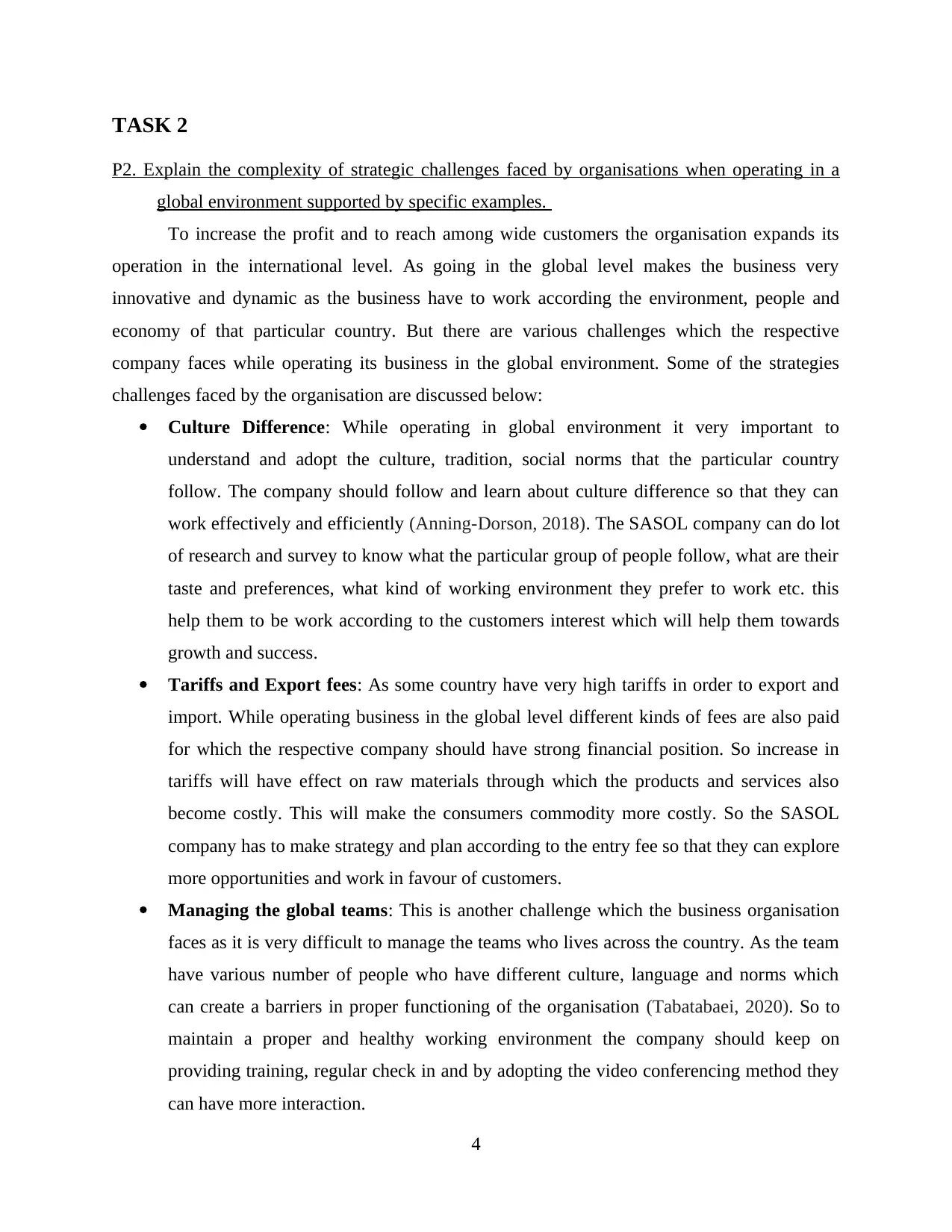
TASK 2
P2. Explain the complexity of strategic challenges faced by organisations when operating in a
global environment supported by specific examples.
To increase the profit and to reach among wide customers the organisation expands its
operation in the international level. As going in the global level makes the business very
innovative and dynamic as the business have to work according the environment, people and
economy of that particular country. But there are various challenges which the respective
company faces while operating its business in the global environment. Some of the strategies
challenges faced by the organisation are discussed below:
Culture Difference: While operating in global environment it very important to
understand and adopt the culture, tradition, social norms that the particular country
follow. The company should follow and learn about culture difference so that they can
work effectively and efficiently (Anning-Dorson, 2018). The SASOL company can do lot
of research and survey to know what the particular group of people follow, what are their
taste and preferences, what kind of working environment they prefer to work etc. this
help them to be work according to the customers interest which will help them towards
growth and success.
Tariffs and Export fees: As some country have very high tariffs in order to export and
import. While operating business in the global level different kinds of fees are also paid
for which the respective company should have strong financial position. So increase in
tariffs will have effect on raw materials through which the products and services also
become costly. This will make the consumers commodity more costly. So the SASOL
company has to make strategy and plan according to the entry fee so that they can explore
more opportunities and work in favour of customers.
Managing the global teams: This is another challenge which the business organisation
faces as it is very difficult to manage the teams who lives across the country. As the team
have various number of people who have different culture, language and norms which
can create a barriers in proper functioning of the organisation (Tabatabaei, 2020). So to
maintain a proper and healthy working environment the company should keep on
providing training, regular check in and by adopting the video conferencing method they
can have more interaction.
4
P2. Explain the complexity of strategic challenges faced by organisations when operating in a
global environment supported by specific examples.
To increase the profit and to reach among wide customers the organisation expands its
operation in the international level. As going in the global level makes the business very
innovative and dynamic as the business have to work according the environment, people and
economy of that particular country. But there are various challenges which the respective
company faces while operating its business in the global environment. Some of the strategies
challenges faced by the organisation are discussed below:
Culture Difference: While operating in global environment it very important to
understand and adopt the culture, tradition, social norms that the particular country
follow. The company should follow and learn about culture difference so that they can
work effectively and efficiently (Anning-Dorson, 2018). The SASOL company can do lot
of research and survey to know what the particular group of people follow, what are their
taste and preferences, what kind of working environment they prefer to work etc. this
help them to be work according to the customers interest which will help them towards
growth and success.
Tariffs and Export fees: As some country have very high tariffs in order to export and
import. While operating business in the global level different kinds of fees are also paid
for which the respective company should have strong financial position. So increase in
tariffs will have effect on raw materials through which the products and services also
become costly. This will make the consumers commodity more costly. So the SASOL
company has to make strategy and plan according to the entry fee so that they can explore
more opportunities and work in favour of customers.
Managing the global teams: This is another challenge which the business organisation
faces as it is very difficult to manage the teams who lives across the country. As the team
have various number of people who have different culture, language and norms which
can create a barriers in proper functioning of the organisation (Tabatabaei, 2020). So to
maintain a proper and healthy working environment the company should keep on
providing training, regular check in and by adopting the video conferencing method they
can have more interaction.
4
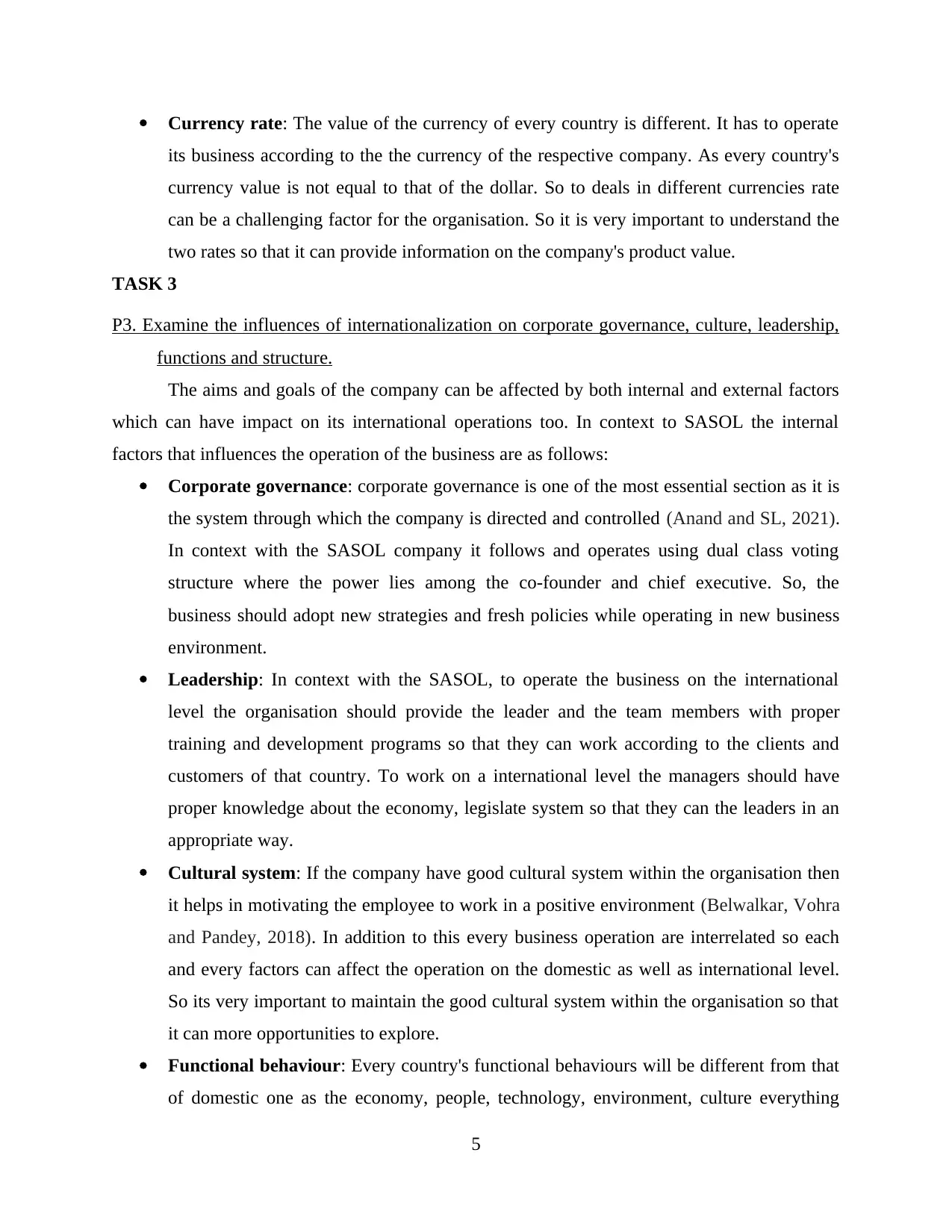
Currency rate: The value of the currency of every country is different. It has to operate
its business according to the the currency of the respective company. As every country's
currency value is not equal to that of the dollar. So to deals in different currencies rate
can be a challenging factor for the organisation. So it is very important to understand the
two rates so that it can provide information on the company's product value.
TASK 3
P3. Examine the influences of internationalization on corporate governance, culture, leadership,
functions and structure.
The aims and goals of the company can be affected by both internal and external factors
which can have impact on its international operations too. In context to SASOL the internal
factors that influences the operation of the business are as follows:
Corporate governance: corporate governance is one of the most essential section as it is
the system through which the company is directed and controlled (Anand and SL, 2021).
In context with the SASOL company it follows and operates using dual class voting
structure where the power lies among the co-founder and chief executive. So, the
business should adopt new strategies and fresh policies while operating in new business
environment.
Leadership: In context with the SASOL, to operate the business on the international
level the organisation should provide the leader and the team members with proper
training and development programs so that they can work according to the clients and
customers of that country. To work on a international level the managers should have
proper knowledge about the economy, legislate system so that they can the leaders in an
appropriate way.
Cultural system: If the company have good cultural system within the organisation then
it helps in motivating the employee to work in a positive environment (Belwalkar, Vohra
and Pandey, 2018). In addition to this every business operation are interrelated so each
and every factors can affect the operation on the domestic as well as international level.
So its very important to maintain the good cultural system within the organisation so that
it can more opportunities to explore.
Functional behaviour: Every country's functional behaviours will be different from that
of domestic one as the economy, people, technology, environment, culture everything
5
its business according to the the currency of the respective company. As every country's
currency value is not equal to that of the dollar. So to deals in different currencies rate
can be a challenging factor for the organisation. So it is very important to understand the
two rates so that it can provide information on the company's product value.
TASK 3
P3. Examine the influences of internationalization on corporate governance, culture, leadership,
functions and structure.
The aims and goals of the company can be affected by both internal and external factors
which can have impact on its international operations too. In context to SASOL the internal
factors that influences the operation of the business are as follows:
Corporate governance: corporate governance is one of the most essential section as it is
the system through which the company is directed and controlled (Anand and SL, 2021).
In context with the SASOL company it follows and operates using dual class voting
structure where the power lies among the co-founder and chief executive. So, the
business should adopt new strategies and fresh policies while operating in new business
environment.
Leadership: In context with the SASOL, to operate the business on the international
level the organisation should provide the leader and the team members with proper
training and development programs so that they can work according to the clients and
customers of that country. To work on a international level the managers should have
proper knowledge about the economy, legislate system so that they can the leaders in an
appropriate way.
Cultural system: If the company have good cultural system within the organisation then
it helps in motivating the employee to work in a positive environment (Belwalkar, Vohra
and Pandey, 2018). In addition to this every business operation are interrelated so each
and every factors can affect the operation on the domestic as well as international level.
So its very important to maintain the good cultural system within the organisation so that
it can more opportunities to explore.
Functional behaviour: Every country's functional behaviours will be different from that
of domestic one as the economy, people, technology, environment, culture everything
5
Paraphrase This Document
Need a fresh take? Get an instant paraphrase of this document with our AI Paraphraser
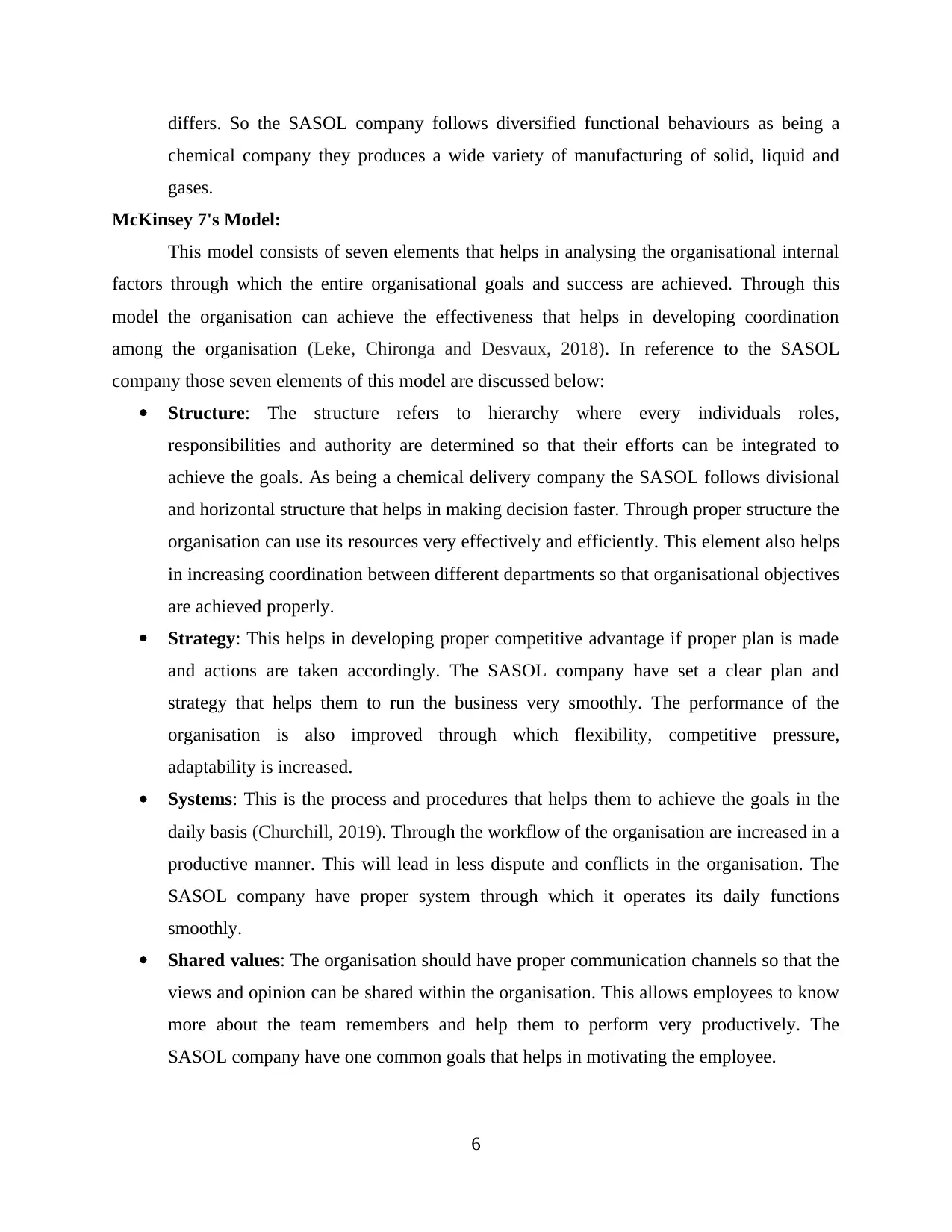
differs. So the SASOL company follows diversified functional behaviours as being a
chemical company they produces a wide variety of manufacturing of solid, liquid and
gases.
McKinsey 7's Model:
This model consists of seven elements that helps in analysing the organisational internal
factors through which the entire organisational goals and success are achieved. Through this
model the organisation can achieve the effectiveness that helps in developing coordination
among the organisation (Leke, Chironga and Desvaux, 2018). In reference to the SASOL
company those seven elements of this model are discussed below:
Structure: The structure refers to hierarchy where every individuals roles,
responsibilities and authority are determined so that their efforts can be integrated to
achieve the goals. As being a chemical delivery company the SASOL follows divisional
and horizontal structure that helps in making decision faster. Through proper structure the
organisation can use its resources very effectively and efficiently. This element also helps
in increasing coordination between different departments so that organisational objectives
are achieved properly.
Strategy: This helps in developing proper competitive advantage if proper plan is made
and actions are taken accordingly. The SASOL company have set a clear plan and
strategy that helps them to run the business very smoothly. The performance of the
organisation is also improved through which flexibility, competitive pressure,
adaptability is increased.
Systems: This is the process and procedures that helps them to achieve the goals in the
daily basis (Churchill, 2019). Through the workflow of the organisation are increased in a
productive manner. This will lead in less dispute and conflicts in the organisation. The
SASOL company have proper system through which it operates its daily functions
smoothly.
Shared values: The organisation should have proper communication channels so that the
views and opinion can be shared within the organisation. This allows employees to know
more about the team remembers and help them to perform very productively. The
SASOL company have one common goals that helps in motivating the employee.
6
chemical company they produces a wide variety of manufacturing of solid, liquid and
gases.
McKinsey 7's Model:
This model consists of seven elements that helps in analysing the organisational internal
factors through which the entire organisational goals and success are achieved. Through this
model the organisation can achieve the effectiveness that helps in developing coordination
among the organisation (Leke, Chironga and Desvaux, 2018). In reference to the SASOL
company those seven elements of this model are discussed below:
Structure: The structure refers to hierarchy where every individuals roles,
responsibilities and authority are determined so that their efforts can be integrated to
achieve the goals. As being a chemical delivery company the SASOL follows divisional
and horizontal structure that helps in making decision faster. Through proper structure the
organisation can use its resources very effectively and efficiently. This element also helps
in increasing coordination between different departments so that organisational objectives
are achieved properly.
Strategy: This helps in developing proper competitive advantage if proper plan is made
and actions are taken accordingly. The SASOL company have set a clear plan and
strategy that helps them to run the business very smoothly. The performance of the
organisation is also improved through which flexibility, competitive pressure,
adaptability is increased.
Systems: This is the process and procedures that helps them to achieve the goals in the
daily basis (Churchill, 2019). Through the workflow of the organisation are increased in a
productive manner. This will lead in less dispute and conflicts in the organisation. The
SASOL company have proper system through which it operates its daily functions
smoothly.
Shared values: The organisation should have proper communication channels so that the
views and opinion can be shared within the organisation. This allows employees to know
more about the team remembers and help them to perform very productively. The
SASOL company have one common goals that helps in motivating the employee.
6
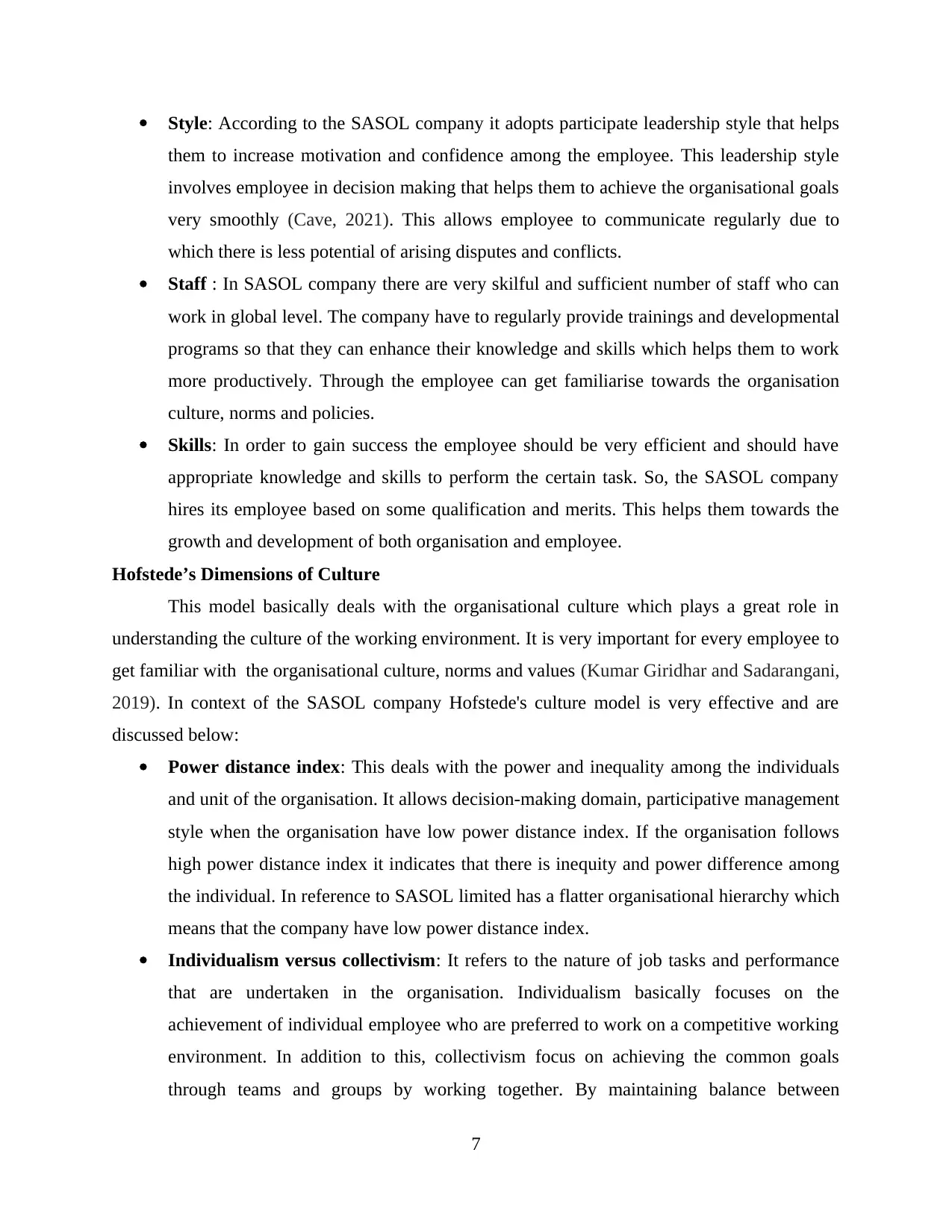
Style: According to the SASOL company it adopts participate leadership style that helps
them to increase motivation and confidence among the employee. This leadership style
involves employee in decision making that helps them to achieve the organisational goals
very smoothly (Cave, 2021). This allows employee to communicate regularly due to
which there is less potential of arising disputes and conflicts.
Staff : In SASOL company there are very skilful and sufficient number of staff who can
work in global level. The company have to regularly provide trainings and developmental
programs so that they can enhance their knowledge and skills which helps them to work
more productively. Through the employee can get familiarise towards the organisation
culture, norms and policies.
Skills: In order to gain success the employee should be very efficient and should have
appropriate knowledge and skills to perform the certain task. So, the SASOL company
hires its employee based on some qualification and merits. This helps them towards the
growth and development of both organisation and employee.
Hofstede’s Dimensions of Culture
This model basically deals with the organisational culture which plays a great role in
understanding the culture of the working environment. It is very important for every employee to
get familiar with the organisational culture, norms and values (Kumar Giridhar and Sadarangani,
2019). In context of the SASOL company Hofstede's culture model is very effective and are
discussed below:
Power distance index: This deals with the power and inequality among the individuals
and unit of the organisation. It allows decision-making domain, participative management
style when the organisation have low power distance index. If the organisation follows
high power distance index it indicates that there is inequity and power difference among
the individual. In reference to SASOL limited has a flatter organisational hierarchy which
means that the company have low power distance index.
Individualism versus collectivism: It refers to the nature of job tasks and performance
that are undertaken in the organisation. Individualism basically focuses on the
achievement of individual employee who are preferred to work on a competitive working
environment. In addition to this, collectivism focus on achieving the common goals
through teams and groups by working together. By maintaining balance between
7
them to increase motivation and confidence among the employee. This leadership style
involves employee in decision making that helps them to achieve the organisational goals
very smoothly (Cave, 2021). This allows employee to communicate regularly due to
which there is less potential of arising disputes and conflicts.
Staff : In SASOL company there are very skilful and sufficient number of staff who can
work in global level. The company have to regularly provide trainings and developmental
programs so that they can enhance their knowledge and skills which helps them to work
more productively. Through the employee can get familiarise towards the organisation
culture, norms and policies.
Skills: In order to gain success the employee should be very efficient and should have
appropriate knowledge and skills to perform the certain task. So, the SASOL company
hires its employee based on some qualification and merits. This helps them towards the
growth and development of both organisation and employee.
Hofstede’s Dimensions of Culture
This model basically deals with the organisational culture which plays a great role in
understanding the culture of the working environment. It is very important for every employee to
get familiar with the organisational culture, norms and values (Kumar Giridhar and Sadarangani,
2019). In context of the SASOL company Hofstede's culture model is very effective and are
discussed below:
Power distance index: This deals with the power and inequality among the individuals
and unit of the organisation. It allows decision-making domain, participative management
style when the organisation have low power distance index. If the organisation follows
high power distance index it indicates that there is inequity and power difference among
the individual. In reference to SASOL limited has a flatter organisational hierarchy which
means that the company have low power distance index.
Individualism versus collectivism: It refers to the nature of job tasks and performance
that are undertaken in the organisation. Individualism basically focuses on the
achievement of individual employee who are preferred to work on a competitive working
environment. In addition to this, collectivism focus on achieving the common goals
through teams and groups by working together. By maintaining balance between
7
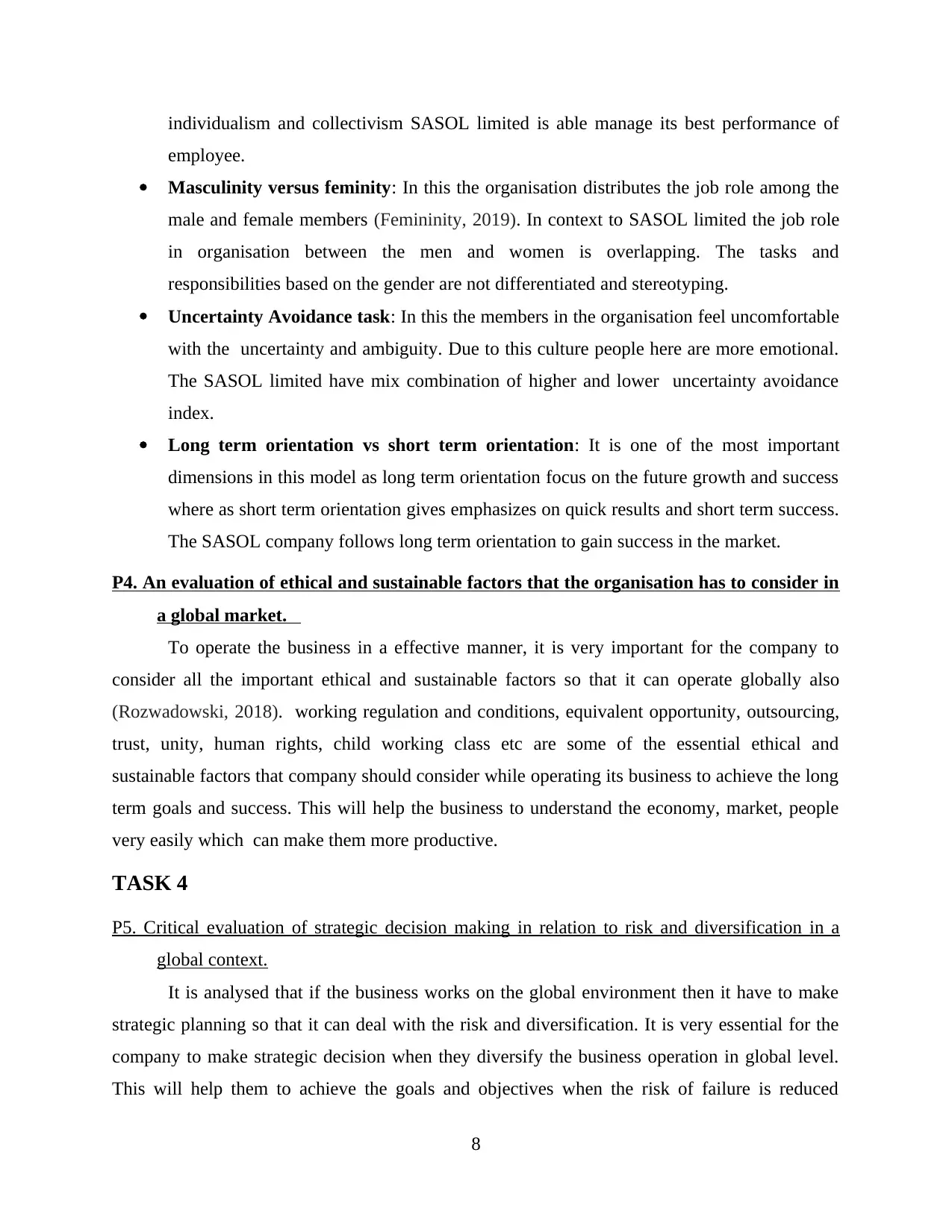
individualism and collectivism SASOL limited is able manage its best performance of
employee.
Masculinity versus feminity: In this the organisation distributes the job role among the
male and female members (Femininity, 2019). In context to SASOL limited the job role
in organisation between the men and women is overlapping. The tasks and
responsibilities based on the gender are not differentiated and stereotyping.
Uncertainty Avoidance task: In this the members in the organisation feel uncomfortable
with the uncertainty and ambiguity. Due to this culture people here are more emotional.
The SASOL limited have mix combination of higher and lower uncertainty avoidance
index.
Long term orientation vs short term orientation: It is one of the most important
dimensions in this model as long term orientation focus on the future growth and success
where as short term orientation gives emphasizes on quick results and short term success.
The SASOL company follows long term orientation to gain success in the market.
P4. An evaluation of ethical and sustainable factors that the organisation has to consider in
a global market.
To operate the business in a effective manner, it is very important for the company to
consider all the important ethical and sustainable factors so that it can operate globally also
(Rozwadowski, 2018). working regulation and conditions, equivalent opportunity, outsourcing,
trust, unity, human rights, child working class etc are some of the essential ethical and
sustainable factors that company should consider while operating its business to achieve the long
term goals and success. This will help the business to understand the economy, market, people
very easily which can make them more productive.
TASK 4
P5. Critical evaluation of strategic decision making in relation to risk and diversification in a
global context.
It is analysed that if the business works on the global environment then it have to make
strategic planning so that it can deal with the risk and diversification. It is very essential for the
company to make strategic decision when they diversify the business operation in global level.
This will help them to achieve the goals and objectives when the risk of failure is reduced
8
employee.
Masculinity versus feminity: In this the organisation distributes the job role among the
male and female members (Femininity, 2019). In context to SASOL limited the job role
in organisation between the men and women is overlapping. The tasks and
responsibilities based on the gender are not differentiated and stereotyping.
Uncertainty Avoidance task: In this the members in the organisation feel uncomfortable
with the uncertainty and ambiguity. Due to this culture people here are more emotional.
The SASOL limited have mix combination of higher and lower uncertainty avoidance
index.
Long term orientation vs short term orientation: It is one of the most important
dimensions in this model as long term orientation focus on the future growth and success
where as short term orientation gives emphasizes on quick results and short term success.
The SASOL company follows long term orientation to gain success in the market.
P4. An evaluation of ethical and sustainable factors that the organisation has to consider in
a global market.
To operate the business in a effective manner, it is very important for the company to
consider all the important ethical and sustainable factors so that it can operate globally also
(Rozwadowski, 2018). working regulation and conditions, equivalent opportunity, outsourcing,
trust, unity, human rights, child working class etc are some of the essential ethical and
sustainable factors that company should consider while operating its business to achieve the long
term goals and success. This will help the business to understand the economy, market, people
very easily which can make them more productive.
TASK 4
P5. Critical evaluation of strategic decision making in relation to risk and diversification in a
global context.
It is analysed that if the business works on the global environment then it have to make
strategic planning so that it can deal with the risk and diversification. It is very essential for the
company to make strategic decision when they diversify the business operation in global level.
This will help them to achieve the goals and objectives when the risk of failure is reduced
8
Secure Best Marks with AI Grader
Need help grading? Try our AI Grader for instant feedback on your assignments.
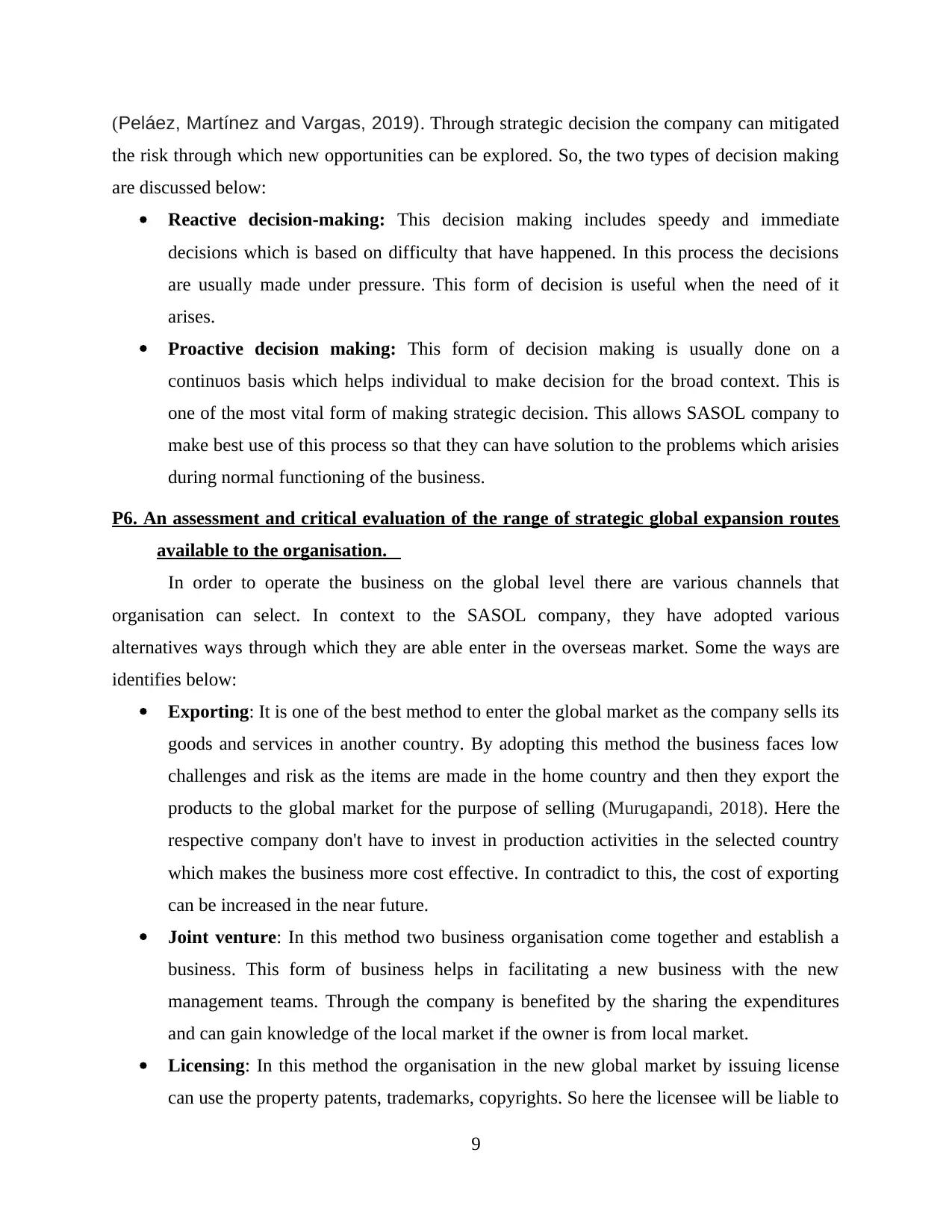
(Peláez, Martínez and Vargas, 2019). Through strategic decision the company can mitigated
the risk through which new opportunities can be explored. So, the two types of decision making
are discussed below:
Reactive decision-making: This decision making includes speedy and immediate
decisions which is based on difficulty that have happened. In this process the decisions
are usually made under pressure. This form of decision is useful when the need of it
arises.
Proactive decision making: This form of decision making is usually done on a
continuos basis which helps individual to make decision for the broad context. This is
one of the most vital form of making strategic decision. This allows SASOL company to
make best use of this process so that they can have solution to the problems which arisies
during normal functioning of the business.
P6. An assessment and critical evaluation of the range of strategic global expansion routes
available to the organisation.
In order to operate the business on the global level there are various channels that
organisation can select. In context to the SASOL company, they have adopted various
alternatives ways through which they are able enter in the overseas market. Some the ways are
identifies below:
Exporting: It is one of the best method to enter the global market as the company sells its
goods and services in another country. By adopting this method the business faces low
challenges and risk as the items are made in the home country and then they export the
products to the global market for the purpose of selling (Murugapandi, 2018). Here the
respective company don't have to invest in production activities in the selected country
which makes the business more cost effective. In contradict to this, the cost of exporting
can be increased in the near future.
Joint venture: In this method two business organisation come together and establish a
business. This form of business helps in facilitating a new business with the new
management teams. Through the company is benefited by the sharing the expenditures
and can gain knowledge of the local market if the owner is from local market.
Licensing: In this method the organisation in the new global market by issuing license
can use the property patents, trademarks, copyrights. So here the licensee will be liable to
9
the risk through which new opportunities can be explored. So, the two types of decision making
are discussed below:
Reactive decision-making: This decision making includes speedy and immediate
decisions which is based on difficulty that have happened. In this process the decisions
are usually made under pressure. This form of decision is useful when the need of it
arises.
Proactive decision making: This form of decision making is usually done on a
continuos basis which helps individual to make decision for the broad context. This is
one of the most vital form of making strategic decision. This allows SASOL company to
make best use of this process so that they can have solution to the problems which arisies
during normal functioning of the business.
P6. An assessment and critical evaluation of the range of strategic global expansion routes
available to the organisation.
In order to operate the business on the global level there are various channels that
organisation can select. In context to the SASOL company, they have adopted various
alternatives ways through which they are able enter in the overseas market. Some the ways are
identifies below:
Exporting: It is one of the best method to enter the global market as the company sells its
goods and services in another country. By adopting this method the business faces low
challenges and risk as the items are made in the home country and then they export the
products to the global market for the purpose of selling (Murugapandi, 2018). Here the
respective company don't have to invest in production activities in the selected country
which makes the business more cost effective. In contradict to this, the cost of exporting
can be increased in the near future.
Joint venture: In this method two business organisation come together and establish a
business. This form of business helps in facilitating a new business with the new
management teams. Through the company is benefited by the sharing the expenditures
and can gain knowledge of the local market if the owner is from local market.
Licensing: In this method the organisation in the new global market by issuing license
can use the property patents, trademarks, copyrights. So here the licensee will be liable to
9
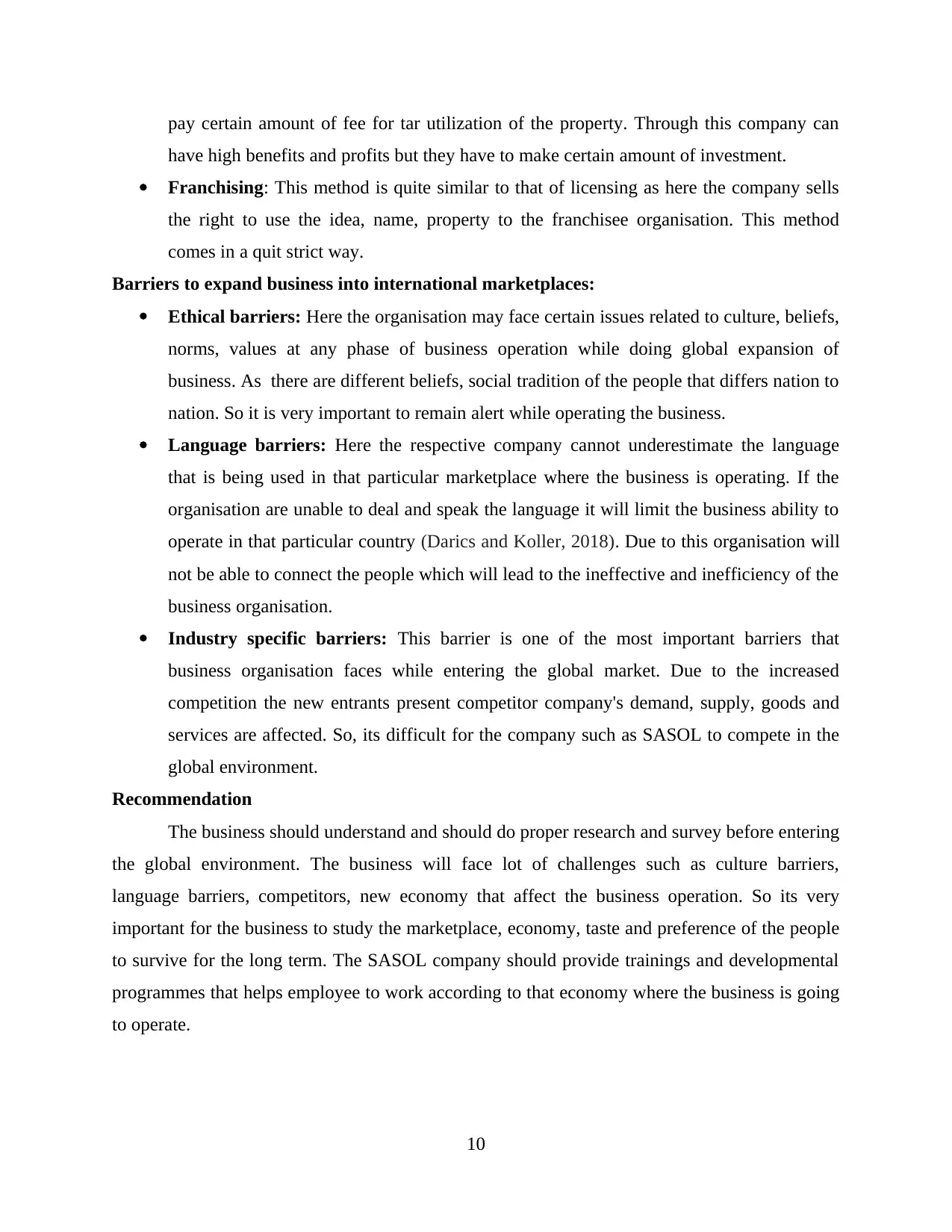
pay certain amount of fee for tar utilization of the property. Through this company can
have high benefits and profits but they have to make certain amount of investment.
Franchising: This method is quite similar to that of licensing as here the company sells
the right to use the idea, name, property to the franchisee organisation. This method
comes in a quit strict way.
Barriers to expand business into international marketplaces:
Ethical barriers: Here the organisation may face certain issues related to culture, beliefs,
norms, values at any phase of business operation while doing global expansion of
business. As there are different beliefs, social tradition of the people that differs nation to
nation. So it is very important to remain alert while operating the business.
Language barriers: Here the respective company cannot underestimate the language
that is being used in that particular marketplace where the business is operating. If the
organisation are unable to deal and speak the language it will limit the business ability to
operate in that particular country (Darics and Koller, 2018). Due to this organisation will
not be able to connect the people which will lead to the ineffective and inefficiency of the
business organisation.
Industry specific barriers: This barrier is one of the most important barriers that
business organisation faces while entering the global market. Due to the increased
competition the new entrants present competitor company's demand, supply, goods and
services are affected. So, its difficult for the company such as SASOL to compete in the
global environment.
Recommendation
The business should understand and should do proper research and survey before entering
the global environment. The business will face lot of challenges such as culture barriers,
language barriers, competitors, new economy that affect the business operation. So its very
important for the business to study the marketplace, economy, taste and preference of the people
to survive for the long term. The SASOL company should provide trainings and developmental
programmes that helps employee to work according to that economy where the business is going
to operate.
10
have high benefits and profits but they have to make certain amount of investment.
Franchising: This method is quite similar to that of licensing as here the company sells
the right to use the idea, name, property to the franchisee organisation. This method
comes in a quit strict way.
Barriers to expand business into international marketplaces:
Ethical barriers: Here the organisation may face certain issues related to culture, beliefs,
norms, values at any phase of business operation while doing global expansion of
business. As there are different beliefs, social tradition of the people that differs nation to
nation. So it is very important to remain alert while operating the business.
Language barriers: Here the respective company cannot underestimate the language
that is being used in that particular marketplace where the business is operating. If the
organisation are unable to deal and speak the language it will limit the business ability to
operate in that particular country (Darics and Koller, 2018). Due to this organisation will
not be able to connect the people which will lead to the ineffective and inefficiency of the
business organisation.
Industry specific barriers: This barrier is one of the most important barriers that
business organisation faces while entering the global market. Due to the increased
competition the new entrants present competitor company's demand, supply, goods and
services are affected. So, its difficult for the company such as SASOL to compete in the
global environment.
Recommendation
The business should understand and should do proper research and survey before entering
the global environment. The business will face lot of challenges such as culture barriers,
language barriers, competitors, new economy that affect the business operation. So its very
important for the business to study the marketplace, economy, taste and preference of the people
to survive for the long term. The SASOL company should provide trainings and developmental
programmes that helps employee to work according to that economy where the business is going
to operate.
10
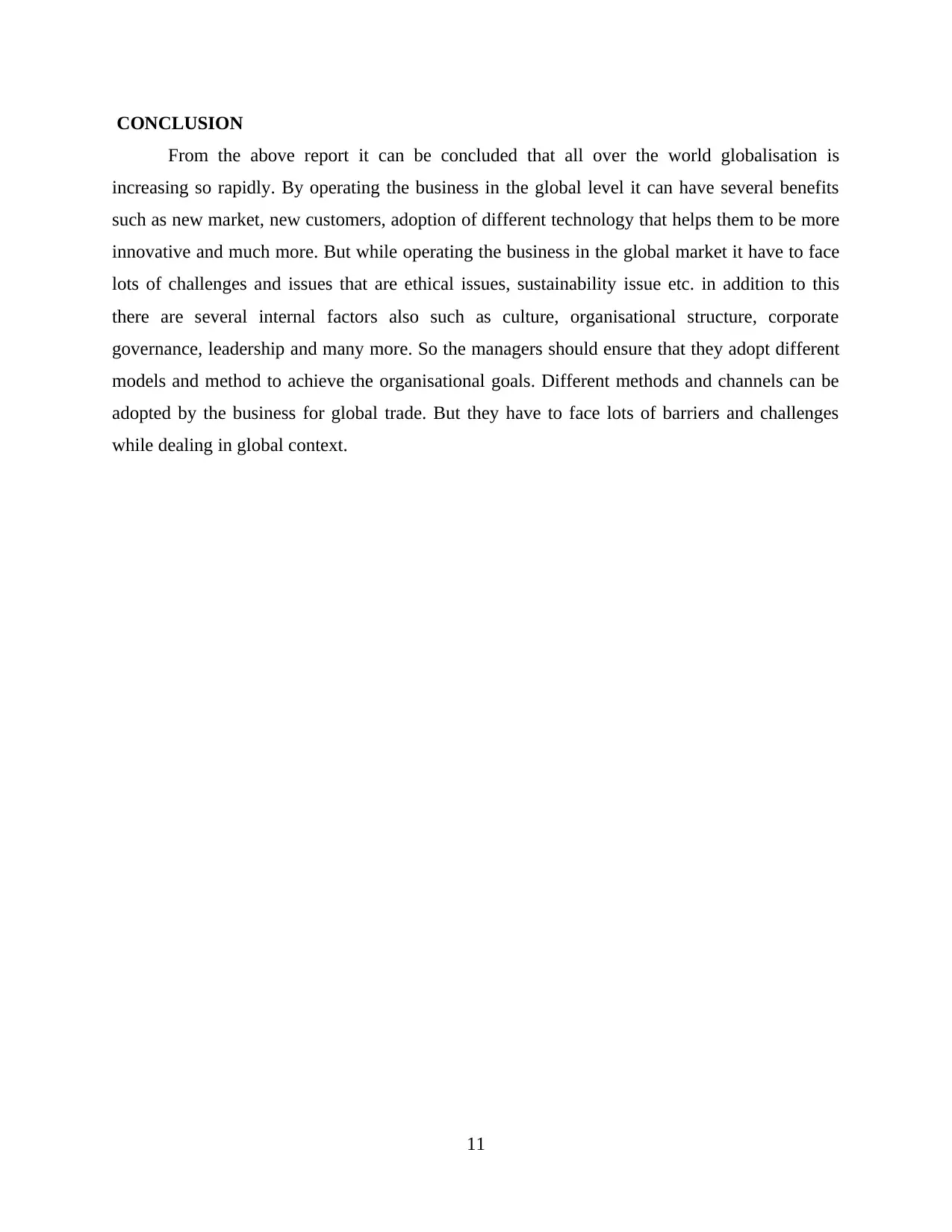
CONCLUSION
From the above report it can be concluded that all over the world globalisation is
increasing so rapidly. By operating the business in the global level it can have several benefits
such as new market, new customers, adoption of different technology that helps them to be more
innovative and much more. But while operating the business in the global market it have to face
lots of challenges and issues that are ethical issues, sustainability issue etc. in addition to this
there are several internal factors also such as culture, organisational structure, corporate
governance, leadership and many more. So the managers should ensure that they adopt different
models and method to achieve the organisational goals. Different methods and channels can be
adopted by the business for global trade. But they have to face lots of barriers and challenges
while dealing in global context.
11
From the above report it can be concluded that all over the world globalisation is
increasing so rapidly. By operating the business in the global level it can have several benefits
such as new market, new customers, adoption of different technology that helps them to be more
innovative and much more. But while operating the business in the global market it have to face
lots of challenges and issues that are ethical issues, sustainability issue etc. in addition to this
there are several internal factors also such as culture, organisational structure, corporate
governance, leadership and many more. So the managers should ensure that they adopt different
models and method to achieve the organisational goals. Different methods and channels can be
adopted by the business for global trade. But they have to face lots of barriers and challenges
while dealing in global context.
11
Paraphrase This Document
Need a fresh take? Get an instant paraphrase of this document with our AI Paraphraser
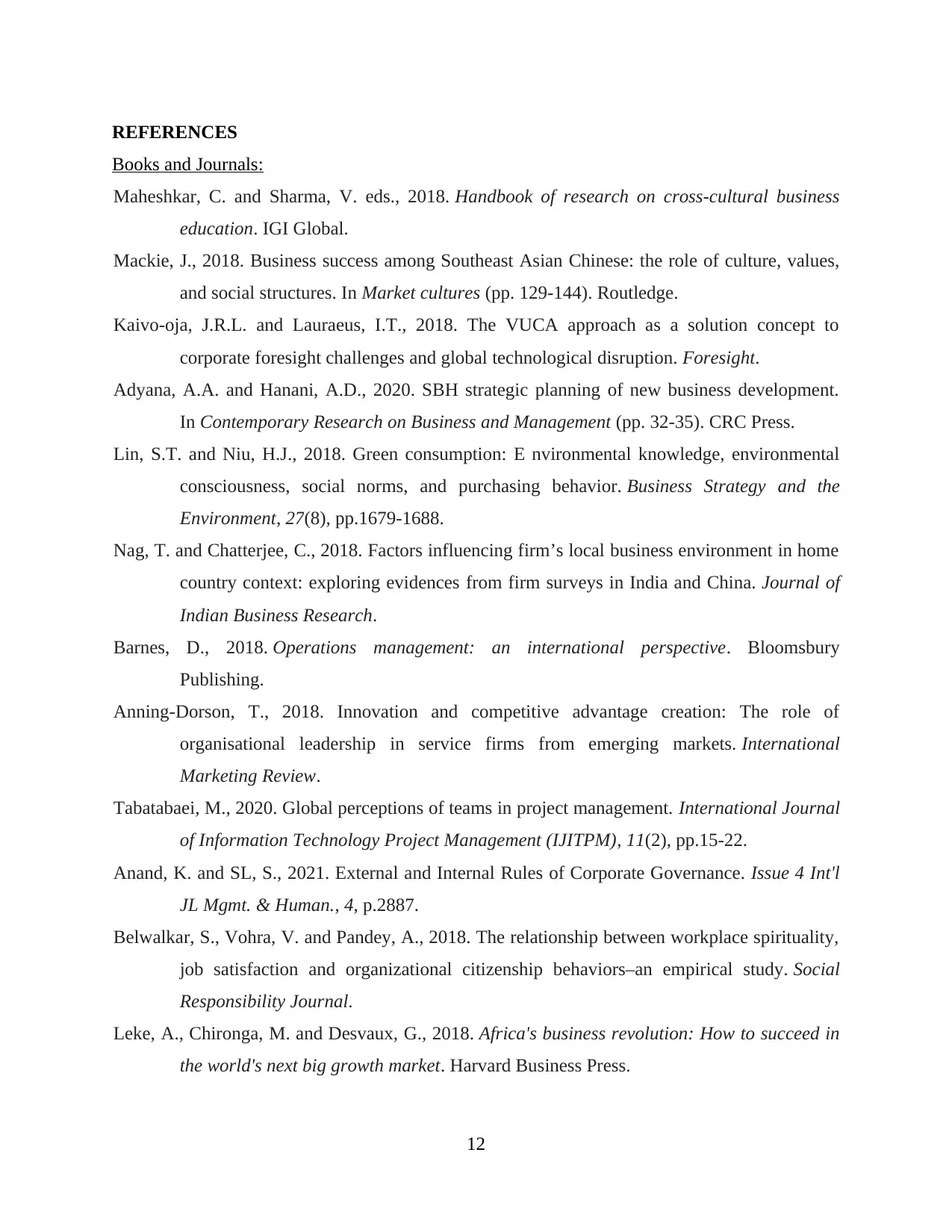
REFERENCES
Books and Journals:
Maheshkar, C. and Sharma, V. eds., 2018. Handbook of research on cross-cultural business
education. IGI Global.
Mackie, J., 2018. Business success among Southeast Asian Chinese: the role of culture, values,
and social structures. In Market cultures (pp. 129-144). Routledge.
Kaivo-oja, J.R.L. and Lauraeus, I.T., 2018. The VUCA approach as a solution concept to
corporate foresight challenges and global technological disruption. Foresight.
Adyana, A.A. and Hanani, A.D., 2020. SBH strategic planning of new business development.
In Contemporary Research on Business and Management (pp. 32-35). CRC Press.
Lin, S.T. and Niu, H.J., 2018. Green consumption: E nvironmental knowledge, environmental
consciousness, social norms, and purchasing behavior. Business Strategy and the
Environment, 27(8), pp.1679-1688.
Nag, T. and Chatterjee, C., 2018. Factors influencing firm’s local business environment in home
country context: exploring evidences from firm surveys in India and China. Journal of
Indian Business Research.
Barnes, D., 2018. Operations management: an international perspective. Bloomsbury
Publishing.
Anning-Dorson, T., 2018. Innovation and competitive advantage creation: The role of
organisational leadership in service firms from emerging markets. International
Marketing Review.
Tabatabaei, M., 2020. Global perceptions of teams in project management. International Journal
of Information Technology Project Management (IJITPM), 11(2), pp.15-22.
Anand, K. and SL, S., 2021. External and Internal Rules of Corporate Governance. Issue 4 Int'l
JL Mgmt. & Human., 4, p.2887.
Belwalkar, S., Vohra, V. and Pandey, A., 2018. The relationship between workplace spirituality,
job satisfaction and organizational citizenship behaviors–an empirical study. Social
Responsibility Journal.
Leke, A., Chironga, M. and Desvaux, G., 2018. Africa's business revolution: How to succeed in
the world's next big growth market. Harvard Business Press.
12
Books and Journals:
Maheshkar, C. and Sharma, V. eds., 2018. Handbook of research on cross-cultural business
education. IGI Global.
Mackie, J., 2018. Business success among Southeast Asian Chinese: the role of culture, values,
and social structures. In Market cultures (pp. 129-144). Routledge.
Kaivo-oja, J.R.L. and Lauraeus, I.T., 2018. The VUCA approach as a solution concept to
corporate foresight challenges and global technological disruption. Foresight.
Adyana, A.A. and Hanani, A.D., 2020. SBH strategic planning of new business development.
In Contemporary Research on Business and Management (pp. 32-35). CRC Press.
Lin, S.T. and Niu, H.J., 2018. Green consumption: E nvironmental knowledge, environmental
consciousness, social norms, and purchasing behavior. Business Strategy and the
Environment, 27(8), pp.1679-1688.
Nag, T. and Chatterjee, C., 2018. Factors influencing firm’s local business environment in home
country context: exploring evidences from firm surveys in India and China. Journal of
Indian Business Research.
Barnes, D., 2018. Operations management: an international perspective. Bloomsbury
Publishing.
Anning-Dorson, T., 2018. Innovation and competitive advantage creation: The role of
organisational leadership in service firms from emerging markets. International
Marketing Review.
Tabatabaei, M., 2020. Global perceptions of teams in project management. International Journal
of Information Technology Project Management (IJITPM), 11(2), pp.15-22.
Anand, K. and SL, S., 2021. External and Internal Rules of Corporate Governance. Issue 4 Int'l
JL Mgmt. & Human., 4, p.2887.
Belwalkar, S., Vohra, V. and Pandey, A., 2018. The relationship between workplace spirituality,
job satisfaction and organizational citizenship behaviors–an empirical study. Social
Responsibility Journal.
Leke, A., Chironga, M. and Desvaux, G., 2018. Africa's business revolution: How to succeed in
the world's next big growth market. Harvard Business Press.
12
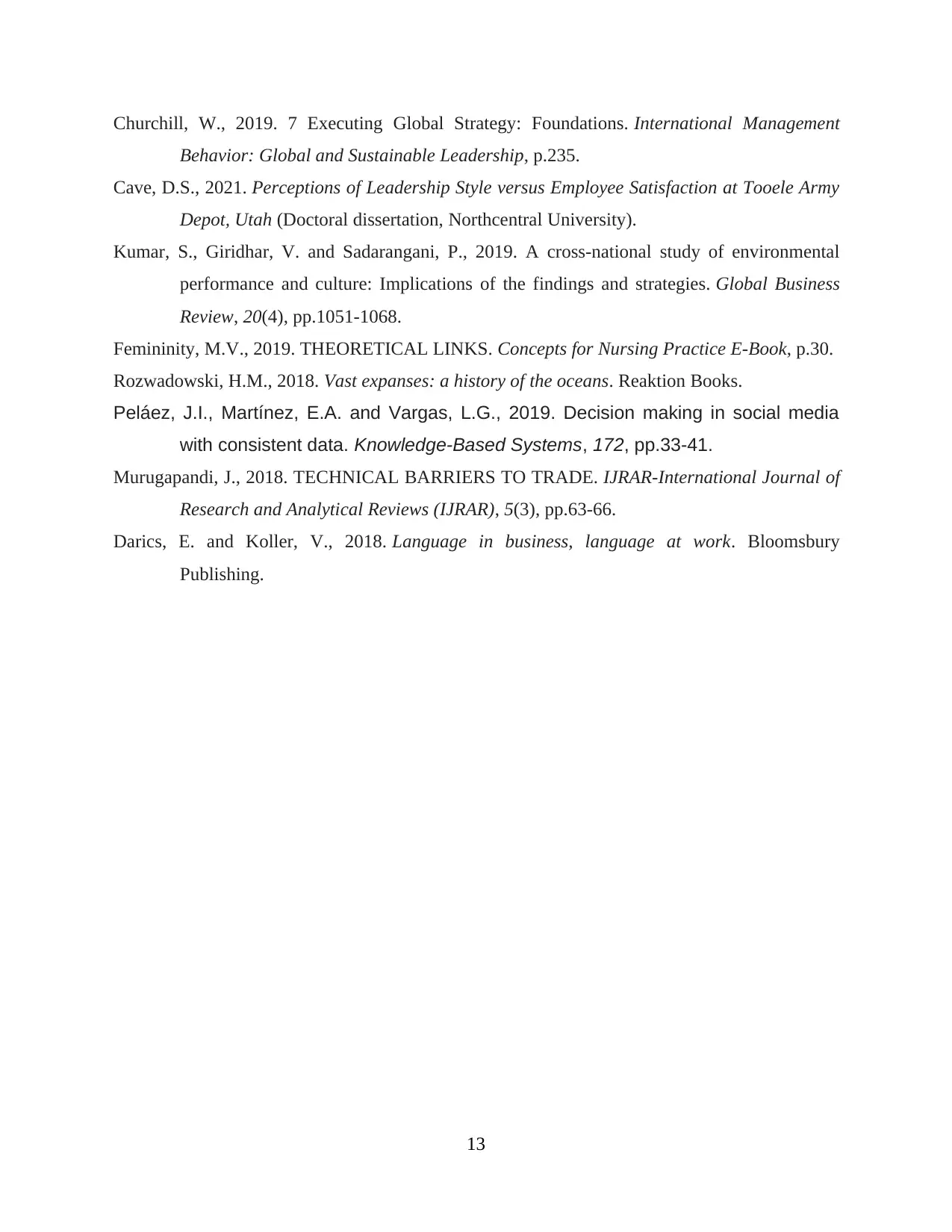
Churchill, W., 2019. 7 Executing Global Strategy: Foundations. International Management
Behavior: Global and Sustainable Leadership, p.235.
Cave, D.S., 2021. Perceptions of Leadership Style versus Employee Satisfaction at Tooele Army
Depot, Utah (Doctoral dissertation, Northcentral University).
Kumar, S., Giridhar, V. and Sadarangani, P., 2019. A cross-national study of environmental
performance and culture: Implications of the findings and strategies. Global Business
Review, 20(4), pp.1051-1068.
Femininity, M.V., 2019. THEORETICAL LINKS. Concepts for Nursing Practice E-Book, p.30.
Rozwadowski, H.M., 2018. Vast expanses: a history of the oceans. Reaktion Books.
Peláez, J.I., Martínez, E.A. and Vargas, L.G., 2019. Decision making in social media
with consistent data. Knowledge-Based Systems, 172, pp.33-41.
Murugapandi, J., 2018. TECHNICAL BARRIERS TO TRADE. IJRAR-International Journal of
Research and Analytical Reviews (IJRAR), 5(3), pp.63-66.
Darics, E. and Koller, V., 2018. Language in business, language at work. Bloomsbury
Publishing.
13
Behavior: Global and Sustainable Leadership, p.235.
Cave, D.S., 2021. Perceptions of Leadership Style versus Employee Satisfaction at Tooele Army
Depot, Utah (Doctoral dissertation, Northcentral University).
Kumar, S., Giridhar, V. and Sadarangani, P., 2019. A cross-national study of environmental
performance and culture: Implications of the findings and strategies. Global Business
Review, 20(4), pp.1051-1068.
Femininity, M.V., 2019. THEORETICAL LINKS. Concepts for Nursing Practice E-Book, p.30.
Rozwadowski, H.M., 2018. Vast expanses: a history of the oceans. Reaktion Books.
Peláez, J.I., Martínez, E.A. and Vargas, L.G., 2019. Decision making in social media
with consistent data. Knowledge-Based Systems, 172, pp.33-41.
Murugapandi, J., 2018. TECHNICAL BARRIERS TO TRADE. IJRAR-International Journal of
Research and Analytical Reviews (IJRAR), 5(3), pp.63-66.
Darics, E. and Koller, V., 2018. Language in business, language at work. Bloomsbury
Publishing.
13
1 out of 15
Related Documents
Your All-in-One AI-Powered Toolkit for Academic Success.
+13062052269
info@desklib.com
Available 24*7 on WhatsApp / Email
![[object Object]](/_next/static/media/star-bottom.7253800d.svg)
Unlock your academic potential
© 2024 | Zucol Services PVT LTD | All rights reserved.





